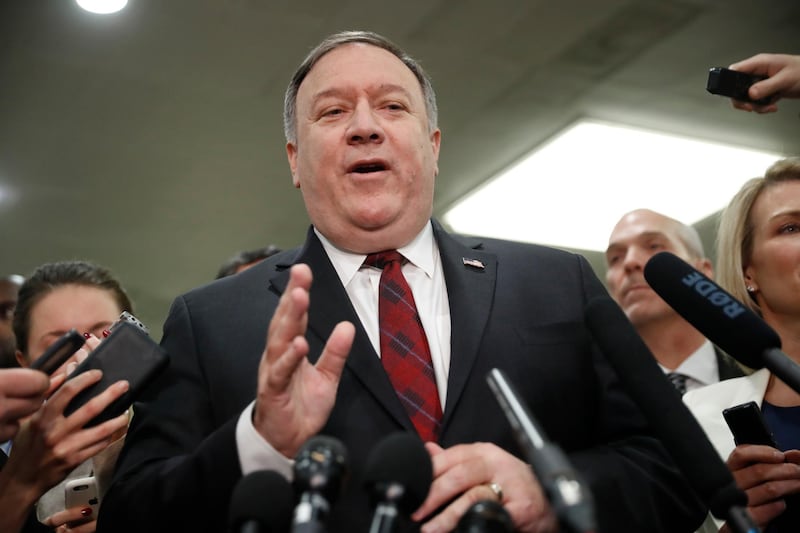Secretary of State Mike Pompeo said on Wednesday that the United States “will never stand” for ballistic missile tests recently conducted by Iran, hitting out at the UN for failing to curb the Islamic republic which he said was openly defying a Security Council resolution tied to the nuclear deal.
Iran is conducting 40 to 50 such tests each year, actions that are destabilising the Middle East, he said in New York, accusing Tehran of exporting those systems to Houthi rebels in Yemen.
Mr Pompeo's comments follow Iran's test on December 1 of a missile he said was capable of “carrying multiple warheads”, breaching UN resolution 2231 which requires Iran “not to undertake any activity related to ballistic missiles designed to be capable of delivering nuclear weapons."
That resolution was agreed at the same time as the nuclear deal, putting restrictions on Tehran until 2024, but the diplomatic wording did not explicitly forbid missile activity, effectively opening a loophole for Tehran's test firing to continue.
“Iran has exploited the goodwill of nations and defied multiple Security Council resolutions in its quest for a robust missile force,” Mr Pompeo told the Security Council, blaming the nuclear deal for emboldening the Iranian regime.
“The United States will never stand for this. The level of accountability in Iran has diminished, while the risk has increased. The JCPOA has, without a doubt, to date, shielded the Islamic Republic of Iran from the accountability to the risks it presents to the world.”
The sixth report of the UN Secretary-General in to the 2015 nuclear agreement - known as the Joint Comprehensive Plan of Action – said on Tuesday that Iran was keeping its side of the accord, which was struck during the US administration of president Barack Obama.
Wednesday's Security Council meeting also underscored a chasm that has opened up between the US and other parties – Britain, China, France, Russia and Germany – to the nuclear deal over the reimposition of American sanctions in recent months. The other signatories made collective and individual statements that the agreement must continue, despite the US withdrawal.
The UN report also outlined objections to the US decision, saying the accord “is fundamental to regional and international peace and security”, and suggested that Iran’s missile tests should be addressed separately by UN members.
Beyond that finding, Mr Pompeo thanked Britain, France, the UAE and Saudi Arabia for raising their concerns about Iran's missile tests at the Security Council, calling for sterner action.
“When we, collectively, call upon Iran to cease its ballistic missile activity we must agree to stop it now, but Iran is as defiant of the world's insistence as ever. Because here we are, meeting for the 12th year in a row about Iran's ballistic missiles,” the US secretary of state added.
_______________
Read more:
Mike Pompeo to attend UN Security Council meeting on Iran
Britain accuses Iran of flouting UN resolution with new missile test
UN says more suspected Iranian missiles found in Yemen
_______________






